Faith leaders conclude the Interchurch Center’s first Season of Creation Interfaith Gathering with a ceremony in Riverside Park.
As we near the end of 2025 – this “Ecumenical Year” in which so many major anniversaries are being celebrated and the future of interchurch and interreligious peacebuilding is coming into focus as increasingly urgent – Graymoor Ecumenical & Interreligious Institute (GEII) has completed a busy month of new initiatives and partnerships that are already bearing fruit.
On October 1-3, we hosted a Season of Creation Interfaith Gathering at the Interchurch Center in Manhattan, where GEII has been based since the 1980s. Collaborating with the Interfaith Center of New York and the Riverside Park Conservancy (neighboring tenant organizations in the Interchurch Center) as well as the Center for Earth Ethics at Union Theological Seminary, we hosted faith leaders from the Jewish, Muslim, Christian, Hindu, Mexica/Purepecha-Otomi, and Ramapough Munsee Lenape communities, for a service of music, prayer, and reflection on humanity’s integrity with and responsibility for all creation. The service concluded with a procession from the Interchurch Center Chapel out into Riverside Park, where the faith leaders poured the water they had blessed during the service into the roots of a great American Elm tree. Two days later, Interchurch Center tenant staff (including from GEII) came together for a service project in Riverside Park, removing invasive species under the guidance of the Riverside Park Conservancy, concluding the Interchurch Center’s inaugural observance of the Season of Creation with a pivot from spiritual reflection to collaborative action in service of our shared environment.
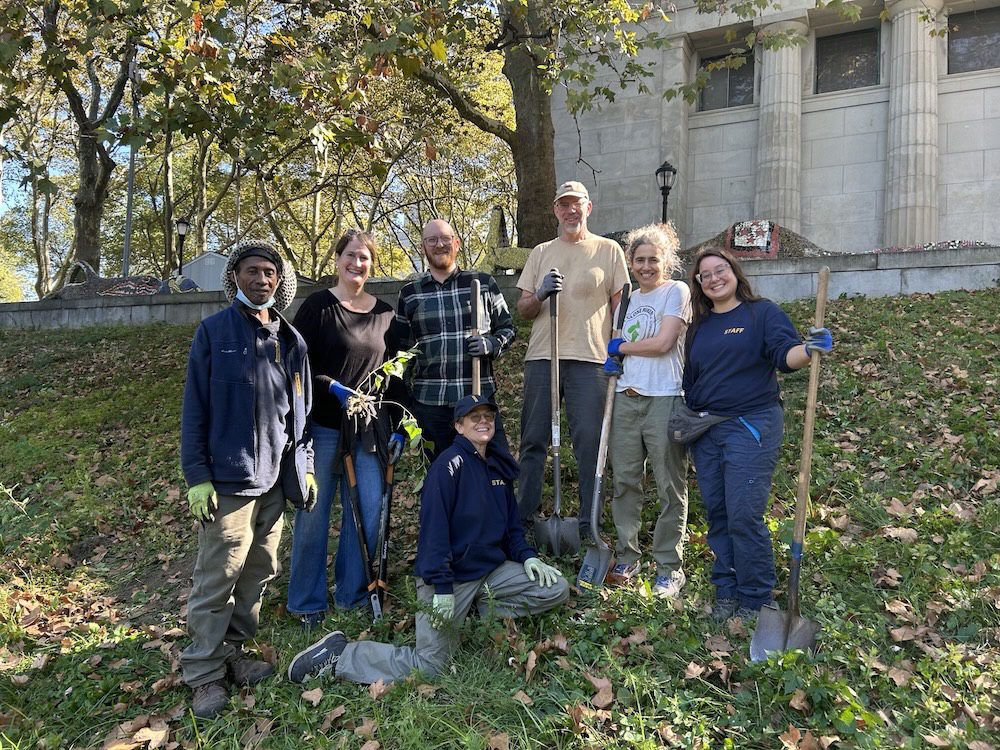
Faith leaders conclude the Interchurch Center’s first Season of Creation Interfaith Gathering with a ceremony in Riverside Park.
On October 11, GEII’s executive director, Dr. Aaron Hollander joined the Community at the Crossing, a residential ecumenical community based at the Episcopal Cathedral of St. John the Divine and overseen by the Chemin Neuf Community, for the third year in a row as the instructor for the Community’s educational module on “Christian Division and Unity.” Dr. Hollander led a morning session charting the history of the early and medieval church, showing that the major schismatic moments when Christian diversity devolved into Christian division were products of their time, being neither inevitable nor irreversible. In the afternoon, his second session took up the modern ecumenical movement, examining the four key “streams” of missionary ecumenism, Faith & Order, Life & Work, and spiritual ecumenism. Dr. Hollander is available to offer versions of these teaching modules as adult formation sessions or workshops in university or seminary settings.
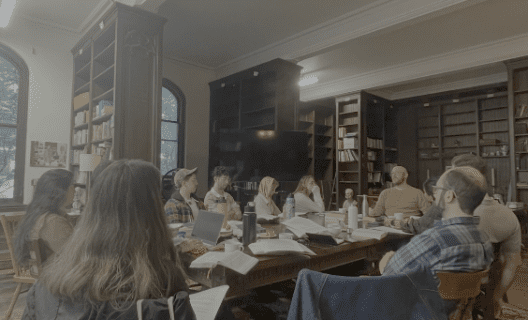
Dr. Aaron Hollander teaches residential and local members of the Community at the Crossing, in a module on the history of Christian division and reconciliation.
On October 13-14, Dr. Hollander traveled to Boston to participate in a panel of ecumenical leaders hosted by the National Council of Churches, as part of the NCC’s 75th Anniversary Gathering. The panel was entitled “Challenges and Opportunities of Ecumenism in a Polarized Society,” and Dr. Hollander spoke alongside the Rev. Dr. Jean Hawxhurst (Ecumenical Staff Officer, United Methodist Conference of Bishops), the Rev. Dr. Monica Schaap Pierce (Executive Director, Christian Churches Together), and the Rev. Dr. Angelique Walker-Smith (President from North America, World Council of Churches). Dr. Hollander spoke about some crucial insights for our contemporary moral/political environment in the United States available in the pioneering sectarianism research undertaken in Northern Ireland during and after the Troubles. The video recording of the panel is available on YouTube.
 Dr. Aaron Hollander speaks on a National Council of Churches panel alongside the Rev. Dr. Angelique Walker-Smith.
Dr. Aaron Hollander speaks on a National Council of Churches panel alongside the Rev. Dr. Angelique Walker-Smith.
On October 19, we returned to St. John the Divine for the first of our 2025-2026 “Dialogues on Divinity Series,” which GEII is co-organizing alongside the Community at the Crossing. In this first installation, also co-sponsored by the Milstein Center for Interreligious Dialogue at Jewish Theological Seminary, we welcomed Hana Bendcowsky and John Munayer (an Israeli Jew and a Palestinian Christian), program staff at the Rossing Center for Education and Dialogue in Jerusalem. The dialogue, entitled “Cycles of Conflict and the Healing of Hatred,” introduced a spellbound audience in the Cathedral to the Rossing Center’s trauma-informed methodology, based in the tools of spiritual counseling, for beginning to uproot the forms of hate that we too easily internalize and become trapped by in situations of intense conflict and betrayal.
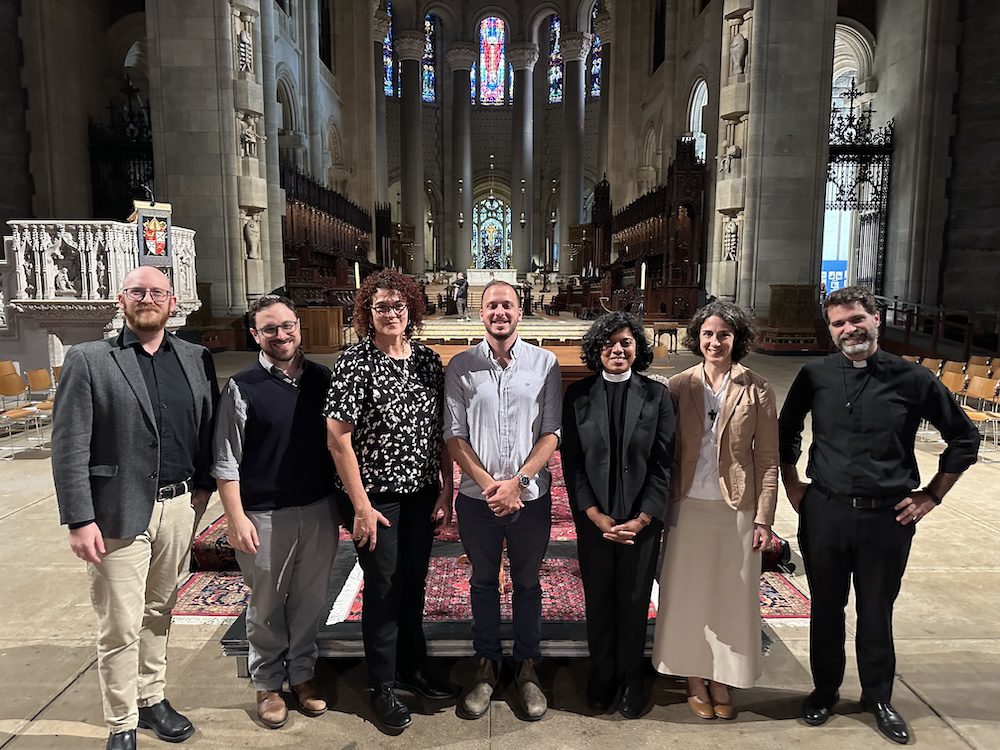 Speakers and organizing partners for the first 2025-26 Dialogue on Divinity, at the Cathedral of St. John the Divine: “Cycles of Conflict and the Healing of Hatred.”
Speakers and organizing partners for the first 2025-26 Dialogue on Divinity, at the Cathedral of St. John the Divine: “Cycles of Conflict and the Healing of Hatred.”
Finally, on October 20, GEII was honored and delighted to co-host the inaugural Paul Wattson Lecture at Fordham University. After fifty years of Paul Wattson Lectures being hosted at universities across North America and overseas, honoring the legacy of the founder of the Franciscan Friars of the Atonement through distinguished public scholarship, 2025 marked the first time the lecture series came to New York City. Following afternoon events hosted by Fordham’s Campus Ministry Program and Theology Department, the evening’s lecturer was Professor Susannah Heschel, Eli M. Black Distinguished Professor of Jewish Studies at Dartmouth College, who spoke on “The Faith of Others: The Inspiration of Interreligious Dialogue in Light of Nostra Aetate”; Heather Miller Rubens, Executive Director of the Institute for Islamic, Christian, and Jewish Studies (Baltimore), offered a response. Our organizing partners at the university were delighted by what the Paul Wattson Lecture represented: not only as an event commemorating the 60th anniversary of Vatican II’s Declaration on the Relation of the Church to Non-Christian Religions, but also as the beginning of a longer-term collaboration. The video of the 2025 Paul Wattson Lecture at Fordham University is available on YouTube.
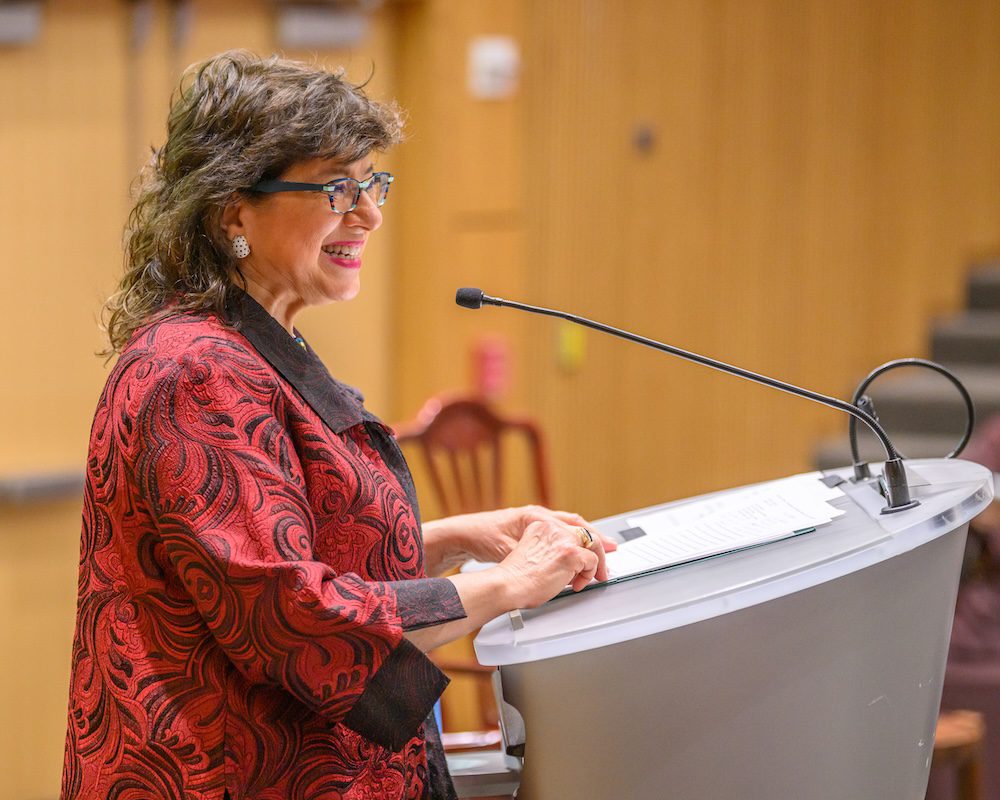 Professor Susannah Heschel (Dartmouth College) addresses an energetic lecture hall during the inaugural Paul Wattson Lecture at Fordham University.
Professor Susannah Heschel (Dartmouth College) addresses an energetic lecture hall during the inaugural Paul Wattson Lecture at Fordham University.
GEII Co-Hosts Major Ecclesiological Conference in Thessaloniki
The 16th Ecclesiological Investigations International Conference was held this past September 17-20, 2025, in Thessaloniki, Greece, contributing to this year’s many events commemorating the 1700th anniversary of the First Council of Nicaea, convened in 325 AD by the Emperor Constantine I. Given that Nicaea took place at a time of remarkable religious pluralism and diversity and was convened in response to the disputes over “what is the Church” within that context, that early ecclesial reality shares an important resonance with our current historical moment. The purpose of the 2025 Ecclesiological Investigations conference was to pose the questions: In what ways does Nicaea continue to shape how we configure the Church today, with what opportunities and at what cost?
The Ecclesiological Investigations International Research Network came into being in 2005, first as a Program Unit of the American Academy of Religion (AAR) and soon expanding into international conferences, a book series with Palgrave MacMillan, collaborations with journals (including Ecumenical Trends), and online symposia. Since 2022, Graymoor Ecumenical & Interreligious Institute has been a regular co-organizing and co-sponsoring partner on major EIIRN events. GEII Executive Director, Aaron Hollander, served as Chair of the Thessaloniki 2025 organizing committee: introducing the conference, moderating its opening plenary session, and offering summary remarks during its final dinner. He also oversaw the awarding of this year’s Graymoor Scholarships, supporting the participation of four exceptional graduate students working in ecumenical and interreligious field, whose work will be published in an upcoming issue of Ecumenical Trends. Click here to read more about the 2025 Graymoor Scholars.
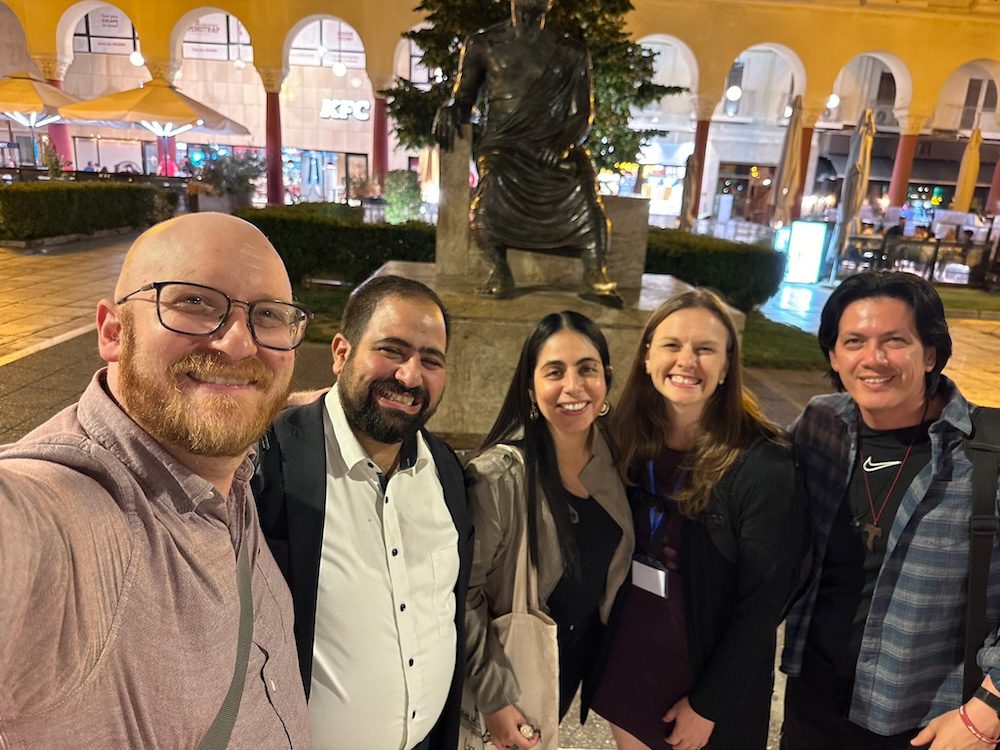 Dr. Aaron Hollander, Br. Yasser Zamora, SA, and a group of Graymoor Scholars past and present.
Dr. Aaron Hollander, Br. Yasser Zamora, SA, and a group of Graymoor Scholars past and present.
Highlights of the conference’s academic proceedings included its four main plenary sessions, during which participants heard substantial lectures from distinguished scholars of church history, theology, contemporary ecumenism, and interreligious studies. These included: “Sophia’s Banquet: Christian Identity, Dissent, and Power,” by the Rev. Dr. Leo Lefebure (Georgetown University); “The Council of Nicaea: Inspiration for Those Seeking Unity Today,” by the Rev. Susan Durber (World Council of Churches); “The Wound of Christian Identity in Times of Division,” by Sr. Dr. Geraldine Smyth (Irish School of Ecumenics, Trinity College Dublin); and “Divine Word and Spirit in a Human Body? ʿIsā ibn Maryam and the Interreligious Debate between Islam and Eastern Christianity,” by Dr. Marco Demichelis (University of Bologna). Video recordings of the plenary lectures are available here.
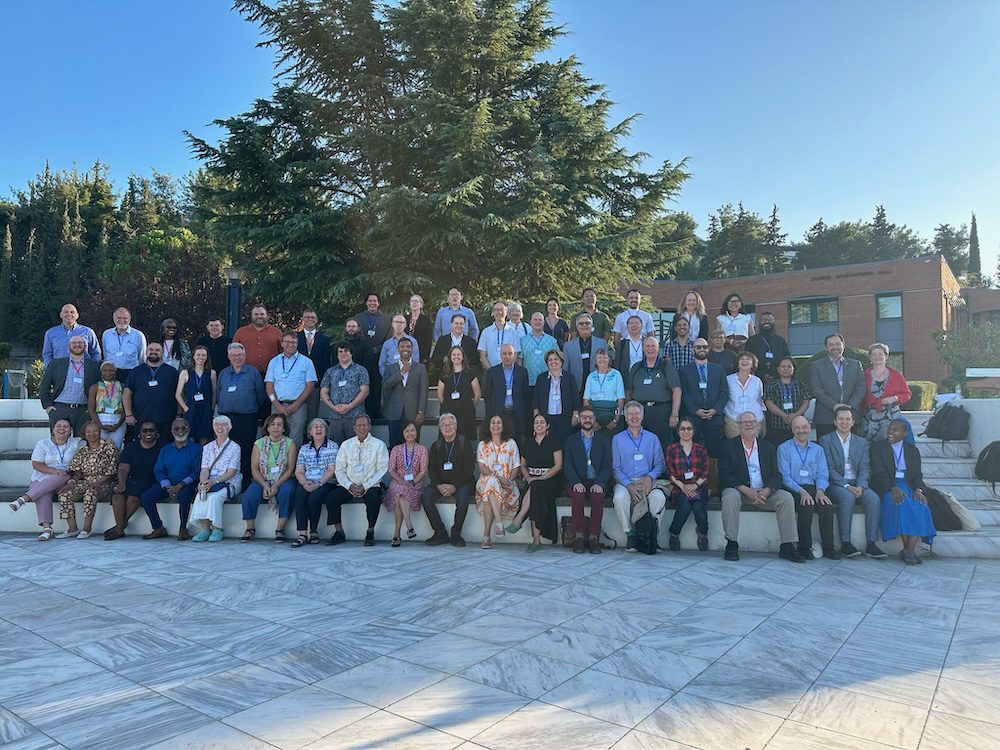 Participants in the 16th Ecclesiological Investigations International Research Network, “Dissent, Power, and Christian Unity after Nicaea.”
Participants in the 16th Ecclesiological Investigations International Research Network, “Dissent, Power, and Christian Unity after Nicaea.”
On the conference’s final day, participants had the remarkable opportunity to visit the “Holy Mountain” of Mount Athos. Since 1054, the Athos peninsula has been the site of an autonomous “monastic republic,” free from external governance by Byzantine, Ottoman, or modern Greek administrations, where the spiritual heritage of Orthodox Christianity has been preserved and developed. Conference participants boarded a boat in Ouranoupoli that traversed the southern coast of the peninsula, visiting with monks from Xenophontes Monastery and providing a profound experience to all involved.
 Dr. Hollander aboard the boat tour along the Athos Peninsula.
Dr. Hollander aboard the boat tour along the Athos Peninsula.
Brother Yasser Zamora, SA, participated in Thessaloniki 2025 as a representative of the Friars of the Atonement, offering one of the conference’s opening prayers and making many new connections among scholars and practitioners across the Christian world. He writes: “To gather in Thessaloniki for this Ecumenical meeting was to experience the biblical vision of ‘At-One-Ment’ made tangible. It was an intellectual and vivential journey through the history of the Nicene Creed, but more profoundly, it was a spiritual encounter with the unbroken whole of the Body of Christ. I recall the warmth of shared coffee breaks, the prayers and the intensity of theological debate, seeing men and women from Orthodox, Catholic, Anglican, and Protestant traditions—from every corner of the world—united by the singular purpose of answering Christ’s prayer for unity. As we talked, prayed, and reflected, the city of Paul itself seemed to whisper a powerful message: Our differences are not obstacles; they are the Spirit’s gifts, enriching the common truth we share. These pictures capture the faces, the light, and the places where we realized that the necessity of Christian unity is, above all, a work of love and mutual hospitality.”
We celebrate the ongoing, fruitful partnership between GEII and EIIRN, and we look forward to the 17th Ecclesiological Investigations International Conference, to be held in 2027 in Temuco, Chile.
By Aaron Hollander, PhD
Executive Director of GEII

